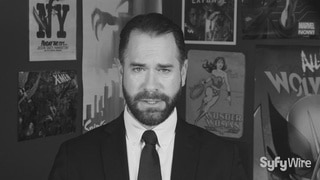Why Season 4 of The Twilight Zone Had Longer Episodes (And Why It Changed Back)
Season 4 of the Twilight Zone marked a major departure in format for the beloved series.
Most Twilight Zone fans will tell you that the first three seasons are the ones that pack the most classic episodes. That's the era when creator Rod Serling was most intimately involved, when the show was in its prime, and when the ideas were flowing freely.
The latter two seasons, though, are still very much worth your time, because they often represent an effort on the part of the show and its creators to take some major swings and keep things afloat. That's especially true in the fourth season, when the show's creatives had to deal with a new, and unwelcome, change in the show's format.
Why The Twilight Zone Shifted to Hourlong Episodes in Season 4
At the end of its third season, The Twilight Zone was an acclaimed, addictive hit for CBS, and everyone expected things to continue into a fourth year. The problem was that the show didn't have a sponsor -- in the mid-20th century, it was common for companies to sign as sponsors for entire seasons of TV to help with funding production -- for the upcoming season, and Serling and company ran out of time to nail one down. With no sponsor, CBS didn't exactly cancel The Twilight Zone, but they did put it on hold, and greenlit a new series called Fair Exchange to replace it in the fall of 1962.
That meant that, for several months when it should have been on screens around the nation, The Twilight Zone was simply gone unexpectedly. The network finally did agree to release a fourth season, but under some new conditions: First, the show would move to a later timeslot, and second, the episodes would be doubled to an hourlong format. Serling wasn't happy with either. For one thing, The Twilight Zone's rhythm of setting up and paying off its concepts was perfectly suited to a half-hour, and for another, airing later in the evening would change the show's audience.
But those weren't the only challenges the new iteration of the show, now titled simply Twilight Zone had to face. In the months when the show was off the air, longtime producer Buck Houghton was forced to take another producing gig, leaving the series without one of its guiding lights. He was replaced by producer Herbert Hirschman, who, according to Marc Scott Zicree's The Twilight Zone Companion, was a welcome addition to the production even if he wasn't one of its founders. We also have Hirschman to thank for those iconic main titles featuring a spinning clock and a strange mannequin, among other artifacts. Hirschman, who also had experience directing, designed those titles himself.
Then there was the matter of Serling. When the show was taken off the air, he accepted a teaching position at Antioch College as part of a much-needed quest to decompress and change his perspective after years of the TV grind. But the grind very much continued, because in addition to teaching, Serling was working on film scripts and churning out new Twilight Zone episodes while also flying back to the studio on off days to shoot his narration segments for each new episode. It was a whole new kind of grind, and according to Hirschman, it created some tension.
"Rod was a tremendously talented writer and very, very facile," Hirschman said, according to Zicree. "He was so much better than the average television writer that even half as good as he was capable of writing was better than most. I think it became easy for him. And our fights consisted of me saying 'Rod, I think you can do better than this.' The scripts were pretty good by television standards, I just thought he was capable of better work, and he had to be flogged and kicked in the ass, frankly, and argued with to bestir him to improve on what was already pretty good. So any arguments we had were basically in those categories where he'd send me a script which, if it came from anybody else, I'd have been thrilled with, but I knew he was capable of better things."
Why Season 5 of The Twilight Zone Went Back to Half-Hour Episodes
With hourlong episodes, CBS was clearly hoping that its critical and commercial hit would bring even more acclaim, attention, and of course revenue, but it turned out it didn't quite work. By the end of the season, the network had renewed the series for a fifth season, but it had also decreed that the original half-hour format would be restored.
So, why the change? Here's how Serling reflected on Season 4, according to Zicree:
"Our shows this season were too padded," he said. "The bulk of our stories lacked the excitement and punch of the shorter dramas we intended when we started five years ago and kept to for a while. If you ask me, I think we had only one really effective show this season, 'On Thursday, We Leave for Home'... Yes, I wrote it myself, but I overwrote it. I think the story was good despite what I did to it."
The Twilight Zone airs regularly on SYFY. Check the schedule for more details.






























